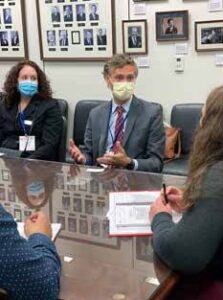
The annual ACEP Leadership & Advocacy Conference (LAC) was held May 1–3 in Washington, DC. Despite the COVID-19 pandemic still lingering in our lives, more than 300 ACEP members from 42 states came together, both in-person and virtually, to educate and advocate together. LAC is an empowering conference, reminding us that we are not alone in fighting to improve the things that make our professional lives and patient care better. For those of you who haven’t ever been to LAC, the conference is a unique blend of both a leadership summit and an advocacy summit touching on the issues that we know are most affecting emergency physicians.
Explore This Issue
ACEP Now: Vol 41 – No 06 – June 2022
Rachel L. Levine, MD Admiral, U.S. Public Health Service Assistant Secretary for Health—U.S. Department of Health and Human Services.
Although the conference officially began on Monday, props again to the ACEP Young Physician Section and EMRA for hosting their annual pre-conference “Health Policy Primer” educational program to kick things off. The official Leadership Summit Day included kickoff presentations and discussions on issues that are “top of mind” for many emergency physicians. Powerful talks on “Burnout: Recognizing It and Addressing It” and “#No Silence on ED Violence: Is It Time to Push the Panic Button?” reminded us just how hard emergency medicine is. These presentations served as a call to action for everyone, especially those in leadership roles, to take an active role in creating a safer and more rewarding practice. These talks were followed by informational talks on “Physician Collective Action: Does Standing on the Picket Line Cross a Moral Line” and “Saying Nope to Expanded Scope: States & Organizations Fighting for Quality Emergency Care.”

Senator Tim Kaine (D-VA) presents “Lorna Breen Health Care Provider Protection Act: What Comes Next?”
The afternoon of the Leadership Summit was just as amazing as the morning session. Led off by a keynote address by Adm. Rachel L. Levine, MD, U.S. Public Health Service Assistant Secretary for Health at the U.S. Department of Health and Human Services, the rest of the afternoon included presentations on examining the role of policymakers in addressing health care market consolidation, the flawed Medicare Physician Fee Schedule, and lessons learned from recent state fights against downcoding and diagnosis exclusion lists by state Medicaid Programs. Following up on the morning’s theme of addressing the personal and professional challenges that face emergency physicians, Senator Tim Kaine (D-VA) highlighted the importance of the recent passage, and signing into law, of the Dr. Lorna Breen Health Care Provider Protection Act, which will provide funding for programs and research to improve the mental health of health care workers.
The advocacy summit on Day 2 provided attendees with an update on the key federal legislative and regulatory issues facing emergency medicine for their Capitol Hill meetings. As with every LAC that ACEP has held, the College develops a set of priority issues and talking points for the Capitol Hill visits. Identifying the “right” issues to focus on during a “fly-in” meeting requires a thoughtful

R.J. Sontag, MD, shares his personal experience with ED violence with Senator Sherrod Brown’s staffers as Ohio ACEP Executive Director Holly Dorr, MBA, CAE, CMP, looks on.
and strategic approach in order to increase our likelihood of advocacy success. That strategy is based upon identifying issues that are both important for emergency physicians and that will resonate on Capitol Hill given the current political climate and priorities of Congress and the Administration. Our goal is to remind legislators that we do “the work of the people every day” and that we need their support and protection to be able to continue that work. This year’s topics focused on improving the protections and rights of emergency physicians:
- Support for the Workplace Violence Prevention for Health Care and Social Service Workers Act (S.4182)
- Urging introduction of the ER Hero and Patient Safety Act to guarantee due process protections for all emergency physicians
- Calling for hearings to reform the flawed Medicare reimbursement system to ensure fair payments to physicians
Each year, while those of us who attend LAC get to tell our stories, we also understand that we are representing emergency physicians across the country and telling your stories too. For many of us, being on duty in the emergency department can feel like an isolating experience, and we can forget that we are part of a larger community. Attending LAC changes that. There is an incredible power to sharing our personal experiences and bringing our collective voices together on Capitol Hill to advocate for our fellow physicians, our patients, and our specialty.
So, come next year to LAC and add your voice! In the meantime, join the 911 Grassroots Network (acep.org/911grassrootsadvocacy) to stay updated and informed on federal and state issues. You can also support ACEP by contributing to NEMPAC as well and help ACEP amplify your voice on the issues that matter most to emergency physicians.
Dr. Cirillo serves on the Board of Directors for ACEP.
Pages: 1 2 3 | Multi-Page







No Responses to “Reflections from the ACEP 2022 Leadership & Advocacy Conference”